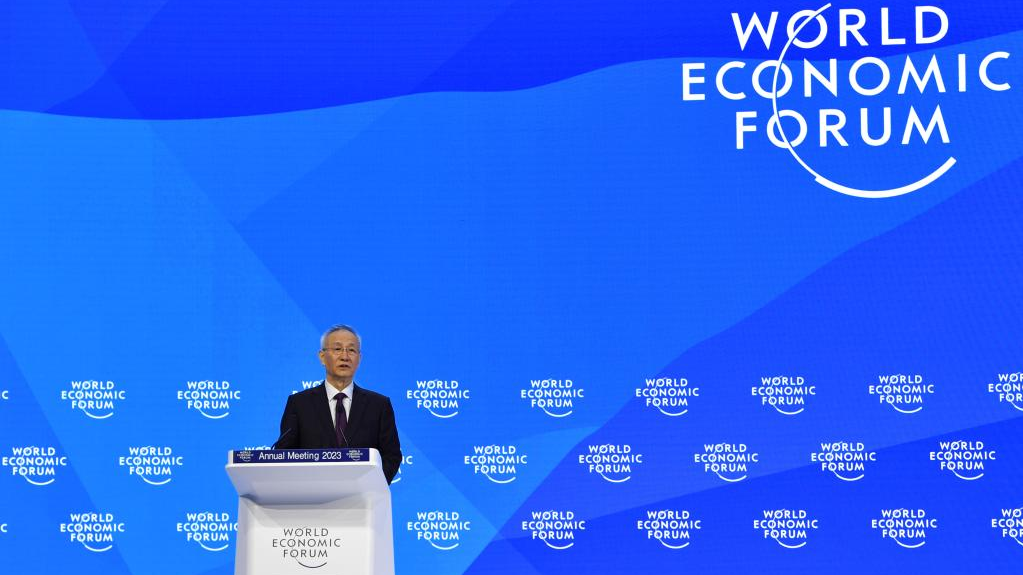
Chinese Vice Premier Liu He delivers a speech at the World Economic Forum Annual Meeting 2023 in Davos, Switzerland, January 17, 2023. [Photo/Xinhua]
By John Gong
Finally the World Economic Forum, also dubbed as the Davos, is convening offline again at its original place in Davos, Switzerland. China's representative to Davos is Vice Premier Liu He, who delivered a speech on January 17. This is his second appearance there after five years.
Liu started his speech with a briefing to the audience about China's current economic status. 2022 is a very difficult year for China and the GDP (gross domestic product) growth figure is at 3 percent for the whole year, amid rounds of lockdowns and quasi-lockdowns nationwide due to COVID-19. Nevertheless Liu's speech delivers hope for the new year.
Now it looks like we are finally climbing out of the COVID hole, as Liu said in the speech that "if we work hard enough, we are confident that growth will most likely return to its normal trend, and the Chinese economy will see a significant improvement in 2023."
What is a "normal trend" for growth in China? Before the pandemic, China's GDP growth rate was 6.1 percent in 2019. I take it as the benchmark for a "normal trend." And I will even put a discount on it, just to be conservative. I will be venturous enough to revise Liu's words a bit by saying it's most likely that the growth rate in China will be more than 5 percent this year. This is because an overwhelming majority of provincial governments have announced GDP growth targets this year at about 5 to 6 percent, even though the central government hasn't announced a target figure yet.
This is premised upon a stable global political environment and cooperation among major economic powerhouses. Vice Premier Liu mentioned the issue of international macro-policy coordination.
The United States and European Union are adopting an anti-inflation policy centered upon interest rate hikes, which would lead to a recession before seeing economic recovery. Liu pointed out that there are complex causes in addition to demand-side factors, for example issues related to energy and food security that are partly causing the inflation. He called upon the leading powers to maintain peace and work together to meet common challenges. Liu raised the issue of a negative impact of interest rate hikes on the emerging markets and developing countries.
"We call for more attention to the negative spillover effect of major countries' rate hikes on the emerging markets and developing countries so as not to add to more debt or financial risks. We stand ready to work with all parties to find solutions to the debt issues of some developing countries," he added.
Inflation is a major problem the world is facing, even though it is less of a problem in China right now. Inflation is stubborn, and it's politically unacceptable. But there is also a trade-off issue here between controlling inflation and stabilizing growth. In today's interconnected world, macro-economic policies among major countries need to be coordinated in the spirit of dealing with the 2008 subprime mortgage crisis in order to be more effective.
And in this regard, China can play a major role. China and the U.S. government can coordinate on intervention measures in the currency market to contain the dollar's strengthening in a high interest rate environment. Both governments can also coordinate on trade in food and energy products to stabilize their global markets. There are areas where Beijing and Washington can work together for a smooth global economic recovery.
John Gong is a professor at the University of International Business and Economics and a research fellow at the Academy of China Open Economy Studies at UIBE.

 中文
中文



